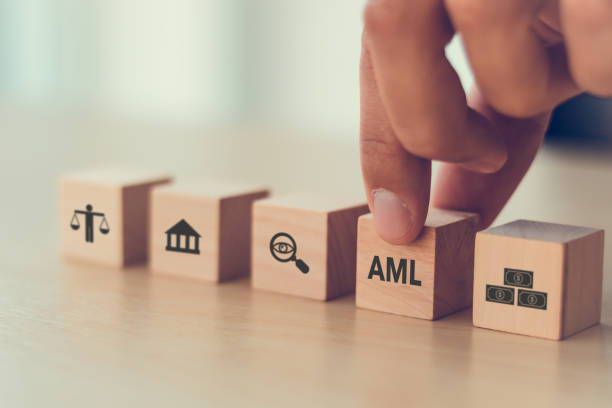The digital landscape has been increasing over time, and the risk factors of money laundering and terrorist funding, along with the threat of identity theft, are growing. The prevention of fraudulent operations has become a necessity to safeguard the company’s and consumers’ data.
Money laundering is referred to as the process of driving money using disguised sources or making illegal transactions through legal mediums.
However, another form of criminal activity is terrorist funding, which includes transactions that could be illicit. Terrorist funding may include money transfers in the use of violating operations.
A statistical analysis is conducted every year to record the money laundering rate across the globe. As of 2022, the number of money laundered was reported to be $23.8 billion in crypto and other emerging industries and in percentile, it was approximately 68% over the whole year.
The rising number is anticipated to grow in the upcoming year if the industries do not move towards the adoption of robust strategies to prevent crimes. Therefore, read the article to learn the approaches to working efficiently in money dealing within distinct sectors.
Quick Insights into Anti-Money Laundering Checks
The concept of anti-money laundering works with the process of preventing, detecting, and validating the money dealing to ensure that it is not transacted with any illicit medium or being used in fraudulent operations.
The AML regulations are essential for all businesses, especially those in crypto, healthcare, fintech, educational, and insurance companies.
These industries are more vulnerable to financial crimes and require strong security protocols against the money proceeding scams.
Role of AML in Financial Fraud
In financial scams, the AML works by detecting the illicit operations involved or associated with them. Under the AML CFT regulations, the Federal Board of Revenue is accountable for all industries to comply with anti-money laundering obligations. It also mitigates the threat rate for monetary crimes and protects business reputation.
Incorporation of AML Screening in Distinct Industries
Crypto Sector
The crypto industry has gained widespread recognition in the investment industry. Businesses can invest in corporations, government and private sectors.
Moreover, it has a positive impact on the business industry with its automated handling of everything. The concerning point arises whether the companies in the crypto sector are incorporating AML monitoring or not.
The inadequate AML compliance in crypto companies makes the exploitation of data and financial crime strategies vulnerable. As the virtual industry expands, the relative innovation of cryptocurrencies requires compliance with AML rules.
The Financial Action Task Force(FATF) plays a crucial role in the development of anti-money laundering regulations. The integration of these laws establishes a secure environment for financial transactions.
It also prevents illicit operations and recognises the requirement to involve crypto enterprises within the regulatory framework.
Education Sector
Like every other sector of the business industry, the education sector is also prone to financial crimes, including money laundering and terrorist funding.
However, to control this illegal money operation, the FATF introduced a robust global mechanism known as anti-money laundering.
The AML has been assisting the education industry with compliance with regulatory bodies along with ensuring the integrity of business.
It also protects student loan funding and detects fake scholarships obtained by providing false documentation. The automated system has AML monitoring that safeguards the online databases and student portals while working as a shield for credentials and academic records.
Healthcare Industry
The imposters might use the healthcare sector as a platform to launder money on a larger scale.
Specifically, the healthcare industries are vulnerable to fraudsters and money dealing scams. This sector operates huge sums of money while dealing with patients who may be involved in identity theft.
The scamming includes the use of money obtained illegally that is used to pay for the services or using healthcare institutions to establish front businesses.
However, the implementation of AML screening assists the sector in protecting the patient and their credentials. It also works by preventing healthcare fraud.
The AML also improves the relationship between the medical assistant sector with financial institutions. The upgraded artificial intelligence in AML provides strong security controls while keeping an eye on unusual activities.
Travel Industry
The travelling sector is an ever-developing industry of all times, and the risk factor of money laundering and illicit transactions is high surprising everyone nowadays.
Nevertheless, with benefits come the negative impacts of the advancement of technology. The highlighted scams include currency exchanging deals, cheaper booking rates and free driving licensing.
However, to overcome these risk factors and payment fraud, AML monitoring works best with KYC strategies to combat these crimes.
The primary purpose of this act is to assist the travelling companies by detecting and reporting suspicious transactions or any operation conducted within the organization.
Closing Statement
Considering all the circumstances of money laundering and the risk associated with it, the importance of anti-money laundering regulations comes forward in order to protect businesses against non-compliance penalties.
It also assists the economic department of the industries in upholding moral responsibility. It avoids the fines and becomes a cost-effective approach for the industry.
The AML strategies disassociate the criminal activities and maintain the business’s credibility.
The strong AML screening and monitoring approaches make all emerging sectors trustworthy for consumers and other governing bodies.

